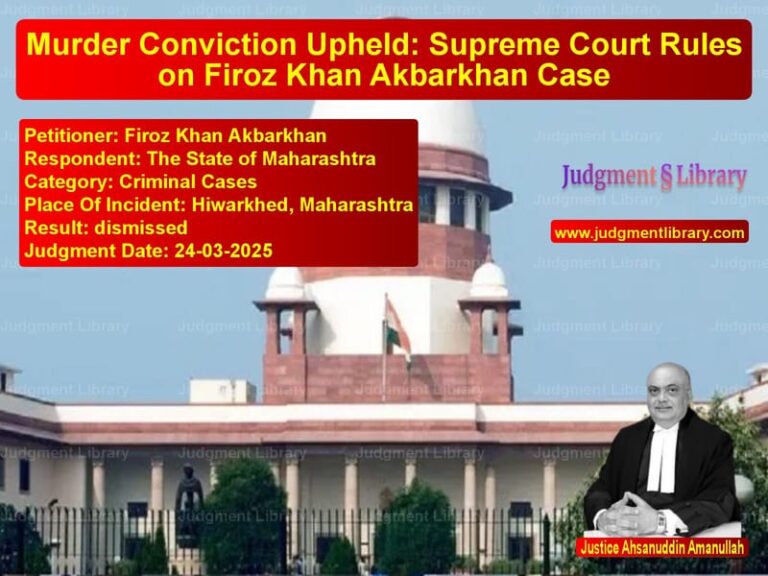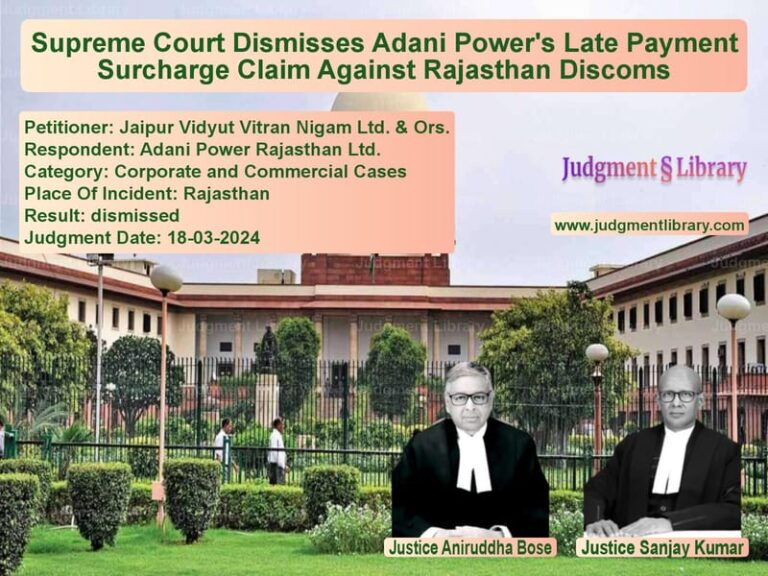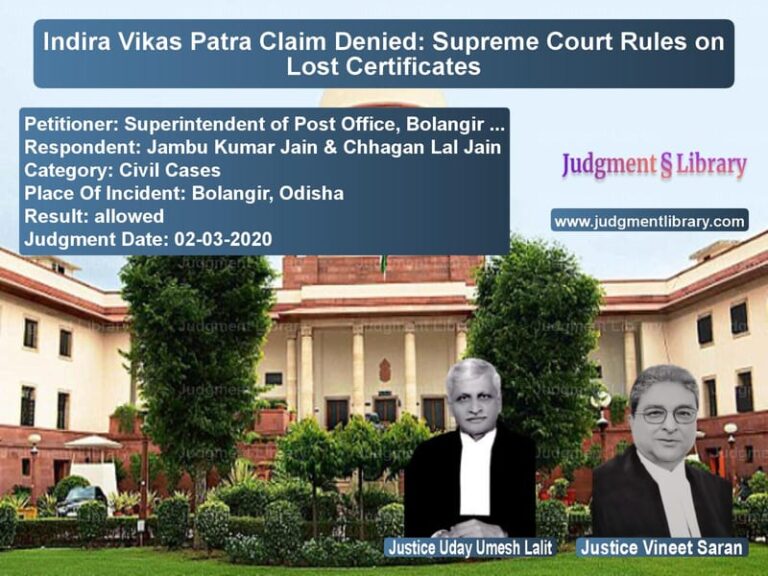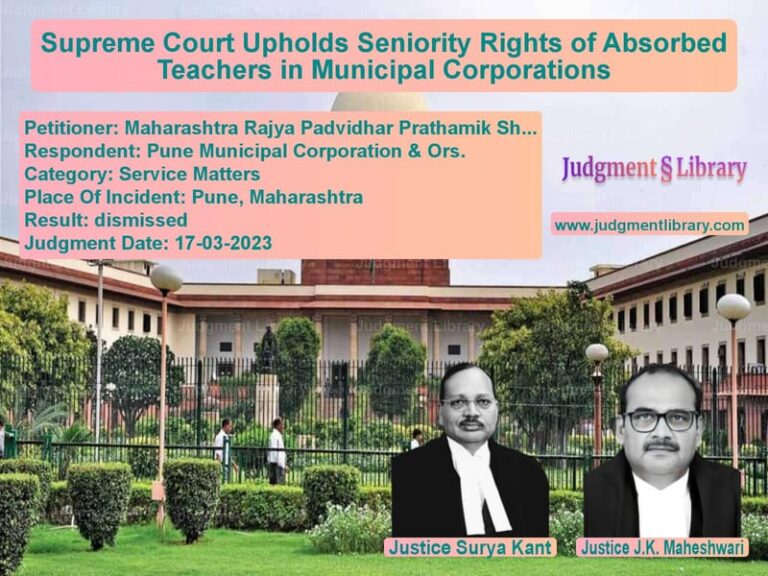Supreme Court Upholds Reservation in Promotion for Persons with Disabilities
The Supreme Court, in the case of The State of Kerala & Ors. v. Leesamma Joseph, addressed the crucial issue of reservation in promotions for persons with disabilities (PwD). The case revolved around the interpretation of the Persons with Disabilities (Equal Opportunities, Protection of Rights and Full Participation) Act, 1995 (1995 Act) and its successor, the Rights of Persons with Disabilities Act, 2016 (2016 Act). The judgment reaffirmed the rights of disabled employees to be considered for reservation in promotions, even if they had entered service through compassionate appointment.
Background of the Case
The case was initiated by Leesamma Joseph, a physically disabled employee who was initially appointed in 1996 as a Typist/Clerk in the Kerala Police Department on compassionate grounds. She had a 55% disability due to Post Polio Residual Paralysis. Despite clearing departmental tests and being eligible for promotion, she was denied the benefit of reservation in promotion under the 1995 Act.
Her request for promotion was rejected, prompting her to approach the Kerala Administrative Tribunal, which ruled against her. However, the Kerala High Court reversed the decision, holding that she was entitled to reservation in promotions. The State of Kerala challenged this decision in the Supreme Court.
Key Legal Issues
- Whether reservation in promotion was available to persons with disabilities under the 1995 Act.
- Whether an employee who entered service through compassionate appointment could claim reservation in promotion.
- Whether identification of posts under Section 32 of the 1995 Act was a prerequisite for granting reservation in promotions.
Arguments of the Parties
Arguments by the State of Kerala
The State of Kerala, represented by its counsel, argued that:
- The 1995 Act provided for reservation at the entry-level but did not mandate reservation in promotions.
- Since Leesamma Joseph was appointed on compassionate grounds and not under the PwD quota, she could not claim reservation in promotions.
- The rules of the Kerala government did not provide for reservation in promotions for PwD.
Arguments by Leesamma Joseph
Leesamma Joseph, represented by her legal team, contended that:
- The 1995 Act and subsequent judgments of the Supreme Court established that reservation for PwD should extend to promotions.
- The fact that she was appointed on compassionate grounds did not exclude her from the benefits available to PwD employees.
- The denial of reservation in promotions amounted to discrimination and violated the principles of equality enshrined in the Constitution.
Supreme Court’s Observations
The Supreme Court, led by Justices Sanjay Kishan Kaul and R. Subhash Reddy, examined the issue in detail. The Court made the following key observations:
- Reservation in promotions was an essential component of equal opportunity for PwD and should not be restricted to the initial appointment.
- The 1995 Act should be interpreted in a manner that promotes the objectives of the law and ensures career progression for disabled employees.
- The Court referred to its earlier judgments in Rajeev Kumar Gupta v. Union of India and Siddaraju v. State of Karnataka, which affirmed the applicability of reservation in promotions.
- It held that compassionate appointment does not negate the right to claim reservation in promotion.
Final Judgment
The Supreme Court upheld the Kerala High Court’s decision and ruled:
- Leesamma Joseph was entitled to reservation in promotions under the 1995 Act.
- The State of Kerala must implement reservation in promotion for PwD within three months.
- The absence of specific rules could not be used to deny promotion to disabled employees.
- All posts identified for PwD in direct recruitment should also be available in promotions.
Impact of the Judgment
This judgment has far-reaching consequences:
- It ensures that persons with disabilities have career growth and are not limited to entry-level jobs.
- It mandates that state governments and public sector units revise their promotion policies to accommodate PwD.
- It reinforces the principle that government policies must align with disability rights laws.
Conclusion
The Supreme Court’s decision in The State of Kerala v. Leesamma Joseph is a landmark ruling that strengthens the rights of persons with disabilities in public employment. By upholding their right to reservation in promotions, the judgment ensures that PwD employees are not unfairly disadvantaged in career progression.
The appeal was dismissed, and the Kerala government was directed to implement reservation in promotions for PwD.
Petitioner Name: The State of Kerala & Ors..Respondent Name: Leesamma Joseph.Judgment By: Justice Sanjay Kishan Kaul, Justice R. Subhash Reddy.Place Of Incident: Kerala, India.Judgment Date: 28-06-2021.
Don’t miss out on the full details! Download the complete judgment in PDF format below and gain valuable insights instantly!
Download Judgment: the-state-of-kerala-vs-leesamma-joseph-supreme-court-of-india-judgment-dated-28-06-2021.pdf
Directly Download Judgment: Directly download this Judgment
See all petitions in Promotion Cases
See all petitions in Public Sector Employees
See all petitions in Recruitment Policies
See all petitions in Judgment by Sanjay Kishan Kaul
See all petitions in Judgment by R. Subhash Reddy
See all petitions in dismissed
See all petitions in supreme court of India judgments June 2021
See all petitions in 2021 judgments
See all posts in Service Matters Category
See all allowed petitions in Service Matters Category
See all Dismissed petitions in Service Matters Category
See all partially allowed petitions in Service Matters Category







